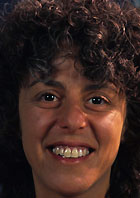Lee Epstein and Barbara Anna Schaal have been elected fellows of the American Academy of Arts and Sciences.
Epstein, Ph.D., is the Mallinckrodt Distinguished University Professor of Political Science in Arts & Sciences and professor of law. Schaal, Ph.D., is the Spencer T. Olin Professor in Arts & Sciences and professor of biology, also in Arts & Sciences.
“Professors Schaal and Epstein are great representatives of Washington University’s rich tradition of scholars who have been recognized by the American Academy of Arts and Sciences for their contributions to science and the humanities,” Chancellor Mark S. Wrighton said. “They symbolize the creativity and inventiveness that is the cornerstone of any prestigious research university, and we are all proud of their accomplishments and the honor they bring to our academic community.”
Schaal and Epstein are among 195 men and women elected this year by the academy, an organization formed in 1870 to cultivate the arts and sciences and to recognize leadership in scholarship, business, the arts and public affairs.
The academy’s membership of over 4,500 includes more than 150 Nobel laureates and 54 Pulitzer Prize winners. Fellows are selected through a highly competitive process that recognizes individuals who have made pre-eminent contributions to their disciplines and to society at large.
This year’s new fellows and foreign honorary members will be welcomed during an Oct. 7 induction ceremony at the academy’s headquarters in Cambridge, Mass.
Epstein joined the political science department in 1991 and soon after became a full professor. From 1995-99, she served as department chair, and in 1998 she was named to the Mallinckrodt professorship.

In 2000, she received a dual appointment when she joined the law school.
Internationally recognized as a leading authority on courts, law and judicial politics, Epstein is fellow of the American Academy of Political and Social Science and the recipient of 10 research grants from the National Science Foundation.
She has authored, co-authored or edited 13 books, including award-winners The Supreme Court Compendium: Data, Decisions, and Developments and The Choices Justices Make.
Epstein has served as a member of the board of directors of the American Judicature Society and as a member of the board of trustees of the Law and Society Association. She sits on the editorial or advisory boards of several scholarly publications and is a past president of the Midwest Political Science Association.
Epstein earned three degrees from Emory University: a bachelor of arts in 1980, a master’s in 1982 and a doctorate in 1983. She taught at Emory and Southern Methodist University before joining WUSTL.
In 2005, Epstein spent a semester as the Jack N. Pritzker Distinguished Visiting Professor of Law at Northwestern University. She join Northwestern’s law faculty this fall.
Schaal investigates the evolutionary process within plant populations using a wide variety of techniques, from field observations to quantitative genetics and molecular biology. She has studied hosts of plant species ranging from oak trees to Mead’s milkweed, a Midwestern prairie plant.

Her recent work has turned to wild relatives of crop species, such as cassava and rice, both major subsistence crops of the tropics. She is known for applying molecular genetic techniques to the study of plant evolution.
Current projects in her lab, many in collaboration with researchers from the Missouri Botanical Garden, span the range from molecular evolution of specific DNA sequences to higher-level systematics.
Schaal was elected a fellow of the American Association for the Advancement of Science and, in 1999, a member of the National Academy of Sciences where she serves as the first woman vice president. In addition, she was on the board of trustees of the St. Louis Academy of Sciences and the Missouri chapter of the Nature Conservancy.
She has been associate editor of the journals Molecular Biology and Evolution, The American Journal of Botany, Molecular Ecology and Conservation Genetics. She was president of the Botanical Society of America and The Society for the Study of Evolution.